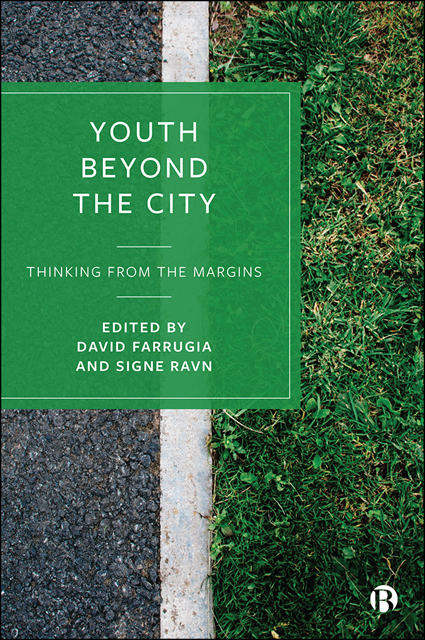Book contents
- Frontmatter
- Contents
- List of Figures and Tables
- Notes on Contributors
- Introduction: Thinking from the Margins
- Part I Inequalities: Education and Aspiration on the Margins
- Part II Materialities: Spatiality and Sensory Embodiment
- Part III Identities: Mobility, Rootedness and Belonging
- Part IV Temporalities: Historicizing Space and Place
- Index
8 - Youth Transitions and Spatiality: The Case of a Deprived Coastal Town in the UK
Published online by Cambridge University Press: 13 October 2022
- Frontmatter
- Contents
- List of Figures and Tables
- Notes on Contributors
- Introduction: Thinking from the Margins
- Part I Inequalities: Education and Aspiration on the Margins
- Part II Materialities: Spatiality and Sensory Embodiment
- Part III Identities: Mobility, Rootedness and Belonging
- Part IV Temporalities: Historicizing Space and Place
- Index
Summary
Introduction
In order to further our understanding of how young people navigate contemporary youth transitions, it is important to recognize the distinct challenges and opportunities for young people who grow up in a variety of social contexts, including the importance of geographical place (MacDonald and Marsh, 2005; Skelton and Gough, 2013; Farrugia, 2014). This chapter explores what it is like to grow up in a deprived coastal town, illustrating how these particular places have distinctive social structures, webs of relationships and cultural meanings attached to them. It also draws attention to the importance of locating young people's identities and aspirations within such contexts, showing how the subjective meanings associated with class are ‘lived out’, and made sense of differently, across a range of contexts. In doing so, it will demonstrate the centrality of localities not only being important sources of cultural identity, but how the structural features of ‘place’ can severely limit the opportunities available to young people.
Highlighting the distinctiveness of geographical place, the chapter draws upon ethnography, participatory arts-based research, and 31 semi-structured interviews with young people aged 15– 25 years of age, who live in a deprived coastal town in the North of England. This research illuminates the complex ways in which young people's classed identities are formed and maintained in diverse spaces of deprivation. It illustrates the push and pull factors that form young people's positioning of mobility, evidenced through ideas of rootedness or connectedness to place, with accompanying narratives of ‘escape’ and mobility in order to ‘get on’ or ‘get out’. This is then contextualized within accounts of affective displacement that embody a sense of not belonging to particular spaces. Understanding these subjective feelings of place is particularly timely and pertinent for young people who find themselves navigating transitions to adulthood in areas framed as ‘left behind’ or ‘struggling’. As global forces continue to deepen structural divisions, the ways in which young people describe and define their cultural worlds provides a useful lens on the impact of such divisions.
- Type
- Chapter
- Information
- Youth beyond the CityThinking from the Margins, pp. 156 - 174Publisher: Bristol University PressPrint publication year: 2022

